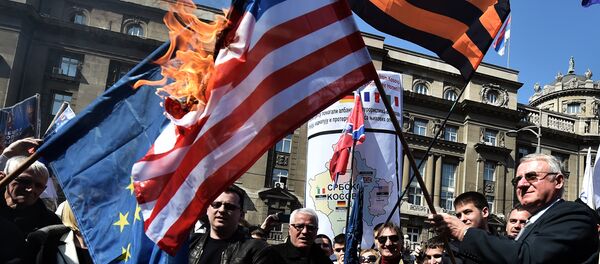The aerial campaign and also NATO’s military intervention in Kosovo were not authorized by the UN Security Council and, therefore, violated international law.
In an interview with Radio Sputnik, Vice President of the International Association of Russian-Speaking Lawyers, Mikhail Ioffe, said that Serbia should have filed the lawsuits immediately after the 1999 bombings.
"From a legal standpoint, they should have brought the charges when the damage [caused by the airstrikes] was there for everyone to see, not now that its traces are no longer evident. Still, the damage they caused to the people’s health is hard to miss,” Ioffe said.
He described the idea of suing NATO for the 1999 airstrikes as “viable.”
Mikhail Ioffe also mentioned a number of legal problems that would prove hard to resolve.
“The question is whether the US will respond to these charges or not. The other countries could likewise want to shirk responsibility for what they did. The biggest hurdle is that [the 1999 bombings] have not been recognized as an international aggression by any authoritative international body,” the lawyer stated.
“The UN refused to authorize them, neither did they term the actions by the US and its coalition partners as an act of aggression. I guess this could be a matter for some backdoor diplomatic bargaining Serbia could benefit from,” Mikhail Ioffe concluded.
NATO launched air strikes in Serbia on March 24, 1999, without the backing of the UN Security Council.
In the course of the campaign, NATO launched 2,300 missiles at almost 1,000 targets and dropped 14,000 bombs, including depleted uranium bombs and cluster munitions.
More than 2,000 civilians were killed, including 88 children, and thousands more were injured. Over 200,000 ethnic Serbs were forced to leave their homeland in Kosovo.






